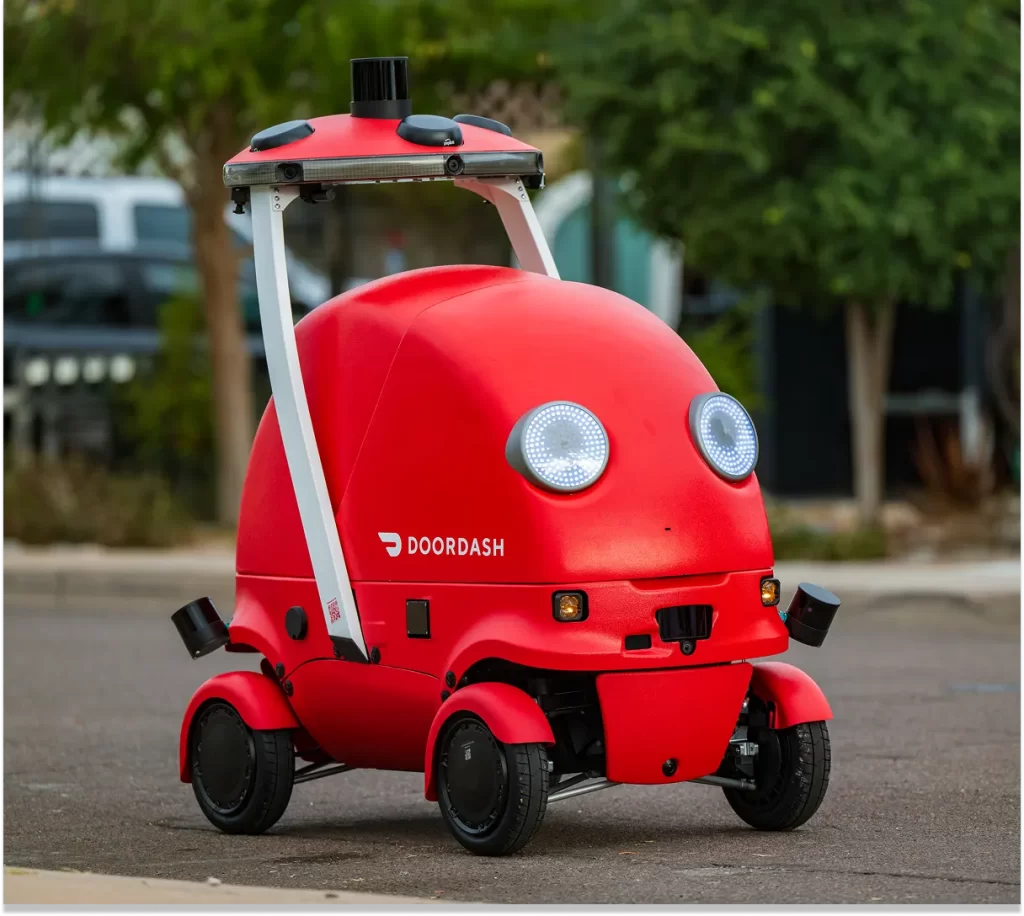DoorDash is moving deeper into automation with the launch of Dot, an in-house–designed delivery robot and a new AI-driven Autonomous Delivery Platform that decides whether your order is handled by a human courier, robot, or drone. The company announced the new hardware and software stack on September 30 and has begun early trials in the Phoenix metro area.

Dot is DoorDash’s first commercial autonomous robot built specifically for local commerce rather than as a general-purpose vehicle. Roughly one-tenth the size of a car and fully electric, it’s designed to operate on bike lanes, neighborhood streets, sidewalks, and driveways at up to 20 mph for short-range deliveries.
According to DoorDash, Dot is “right-sized” for the reality that many orders are small—think toothpaste, snacks, or a single meal—where a full-size car is overkill. The robot’s compartment can hold around 30 pounds of food, enough for several large pizza boxes, and merchants can swap different inserts such as cupholders or insulated containers depending on the order mix.
Built in-house, tied into DoorDash’s core logistics
Dot is the first hardware product developed entirely by DoorDash Labs, the company’s autonomy R&D group. It plugs directly into the existing DoorDash marketplace systems and routing engine rather than being run as a stand-alone pilot. That means the same backend that dispatches human Dashers will also schedule and route Dots, making them just another “vehicle type” in the company’s network.
Navigation relies on a full sensor suite: eight external cameras provide 360-degree vision, backed by radar and lidar to detect obstacles and other road users. DoorDash says those feeds are processed by real-time AI models that blend deep learning with search-based algorithms to select safe, efficient paths through mixed traffic.
The robot runs on a swappable battery pack rather than charging in place, allowing fleet operators to rotate charged packs in and out and keep robots in service longer without long dwell times at a charging dock.
Early deployment in Arizona suburbs
Commercial deployment is starting with an early-access program in Tempe and Mesa, Arizona, where DoorDash is already running small fleets of Dots with select merchants. The company says it aims to expand throughout the Phoenix metro area and eventually into additional markets.
Arizona has become a favored testbed for autonomous vehicles, with permissive regulations and a mix of suburban road types. Dot is aimed squarely at that use case: short neighborhood trips at moderate speeds, not highway hauling. The company pitches the robot’s compact size and electric drivetrain as a way to reduce congestion and emissions compared to car-based deliveries while still moving quickly enough to preserve food quality.
Mesa’s mayor framed the rollout as part of a broader civic bet on automation, calling the pilot an example of “American innovation in action” and arguing that small autonomous delivery vehicles can support local retailers while cutting traffic and pollution.
Autonomous Delivery Platform: an AI dispatcher for people, robots, and drones
Alongside Dot, DoorDash introduced its Autonomous Delivery Platform, an orchestration layer that functions as an AI dispatcher for all modes in its network. For each order, the system weighs factors like speed, cost, distance, and customer experience to decide between a human Dasher, a Dot robot, a partner sidewalk bot, or an aerial drone.
The platform also connects to new merchant tools like SmartScale, an AI-enabled scale that weighs outgoing orders. DoorDash says SmartScale is intended to cut down on missing-item claims and to ensure orders meet weight and packing requirements for newer modes such as drones and compact robots.
Company executives argue that this multi-modal approach is the only viable way to scale autonomy. Rather than trying to replace human couriers outright, Dot and other autonomous systems are meant to absorb highly repetitive, short-trip work so Dashers can focus on more complex, higher-value deliveries that still require human judgment and handoff. DoorDash says human Dashers will continue to handle the “vast majority” of its millions of daily orders for the foreseeable future.

